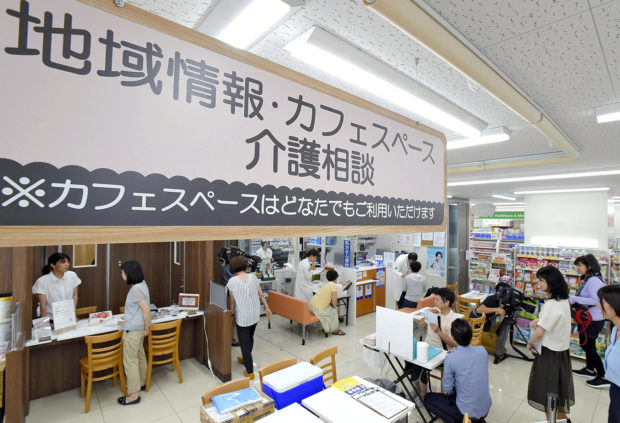
The Yomiuri Shimbun
Customers visit a consultation counter for advice on nursing care and nutrition inside Lawson Inc.’s Sendagi-Shinobazudori store in Bunkyo Ward, Tokyo, on Aug. 1.
TOKYO — Convenience store chains are offering more health-related products and services, in a bid to counter the growing trend of drugstores becoming more like convenience stores by selling products such as bento boxed meals.
The strategy involves expanding the number of convenience stores that sell medicines and even setting up in-store consultation counters where customers can seek advice on nursing care and nutrition.
On Aug. 1, an in-store corner featuring such a counter was opened inside Lawson Inc.’s Sendagi-Shinobazudori store in Bunkyo Ward, Tokyo. Operated in cooperation with a medical corporation, visitors to the counter can ask for advice on their diets and nursing care.
The store also sells medicines and plans to hold health-related events in partnership with a pharmacy and the medical corporation. By providing the consultation service, the store aims to attract more families and elderly people interested in health and nursing care issues.
Such consultation corners have been established at 17 Lawson stores across Japan. Eventually, Lawson plans to expand this number to about 100. “We want to resolve the community issues that arise in an age where many people live to be 100,” Lawson President Sadanobu Takemasu said.
In 2016, FamilyMart Co. also launched a convenience store integrated with a pharmacy where customers can seek advice from a registered dietician. About 85 FamilyMart convenience stores sell medicine, as do about 180 Lawson stores and about 35 Seven-Eleven Japan Co. stores.
The convenience store chains’ increasing focus on the health field comes amid the growth of drugstores strengthening their reach into areas other than medicine.
According to the Economy, Trade and Industry Ministry’s Current Survey of Commerce, the value of goods sold at convenience stores in 2017 increased roughly 2 percent from 2016 to about ¥11 trillion. This growth was eclipsed by drugstores, whose sales grew roughly 5 percent to about ¥6 trillion.
Drugstore operators are also opening new stores at a more rapid rate. In 2017, the number of convenience stores reached 56,374, up about 3 percent from 2015. Over the same period, the number of drugstores jumped about 11 percent to 15,049.
While the convenience store industry continues to open more outlets, the number of customers visiting existing stores has fallen year-on-year for 28 consecutive months. “Drugstores that also offer a widening range of food at low prices are a threat to convenience stores,” an industry insider said.
Drugstores, especially those operated by major chains, are throwing their weight behind sales of items such as bento and onigiri rice balls. Welcia Holdings Co. sells bento and other similar items at about 450 of the about 1,700 stores it operates, and plans to strengthen its lineup of bento and other ready-to-eat dishes.
Meanwhile, cocokara fine Inc., which operates about 1,300 outlets, has started selling bento mainly at its stores in urban areas and introduced self-service coffee machines commonly found at convenience stores at several of its own drugstores.
The competition between drugstores and convenience stores looks set to intensify in the years ahead.

